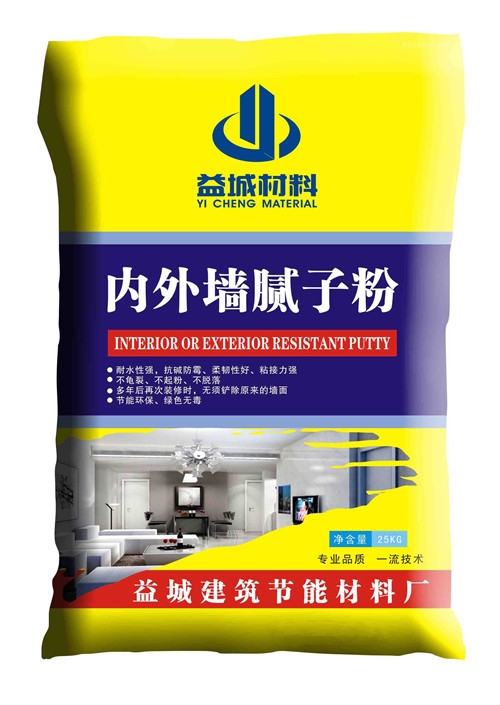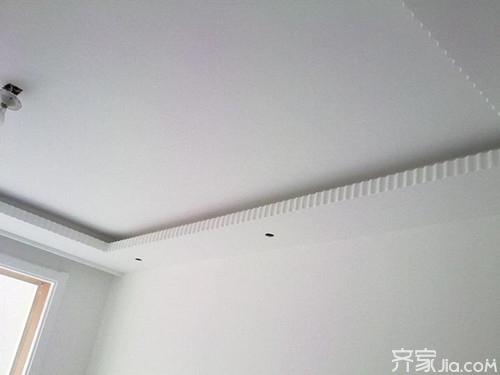The Difference of Interior Wall PuTTY Powder: Causes and Prevention of PuTTY Powder Cracks
Putty powder is a type of building decoration material, the main ingredient is talcum powder and glue. The surface of the newly purchased rough house has a white layer of putty, and the whiteness of the putty is usually above 90 and the fineness is above 330. Putty is a kind of substrate used for wall surface repair and leveling, which lays a good foundation for the next step of decorating (brush painting wallpaper). Putty is divided into two kinds of internal walls and external walls, external wall putty to resist the sun and wind so the gel is large, high strength, environmental protection index is slightly lower. The comprehensive index of interior wall putty is better, health and environmental protection, so the interior wall is not for external use, and the exterior wall is not used internally. Usually putty is plaster or cement-based, so the surface roughness is easier to bond firmly. However, at the time of construction, it is still necessary to apply a layer of interface agent on the grass-roots layer to seal the base layer and improve the adhesion of the wall surface so that the putty can be better bonded to the base surface. Well, many people will ask: What is the difference between exterior wall putty powder ? Can it be mixed? If you have any questions in this area, you may wish to follow me to learn more about the introduction of inner wall exterior wall putty powder ! Inner wall putty powder: PuTTY powder is a one-component interior wall putty powder made of high molecular polymer, methyl Cellulose Ether and other raw materials. The putty powder produced by our factory has good characteristics such as good sturdiness, bonding strength and good waterproof capacity. It is suitable for high-end venues, hotels, restaurants, convention centers, and families, as well as high-end venues that need to prevent the infiltration of external walls. Product Features: The walls of putty powder fiber can be washed with water, do not fall off, do not fall off, and slight impact without leaving marks. How to use: PuTTY powder is mixed with water and stirred for 10 minutes. The paste putty is left standing. After 5 minutes, it can be scraped on the wall. Generally, it is scraped twice. The second time it is scraped, it must wait the first time. After drying, sandpaper should be used immediately (within 24-48 hours). After the leveling, the dust on the entire wall should be removed, and the latex paint can be applied after being dried. Safety and stability: Normal and high temperature decomposition are non-toxic and chemically stable. Exterior putty powder: The putty powder is made of imported high polymer polymer redispersible powder, mixed with methyl cellulose ether, modified Starch Ether, anti-crack fiber as the putty powder mixture weight ratio (3%), and other advanced high-grade putty made of other raw materials. The powder has strong resistance to the micro-cracking of the wall, and has the characteristics of good forehead viscosity, impermeability, reliability, and no shrinkage. Product features: The putty powder produced by our factory has good crack resistance, which greatly saves the overall strong maintenance cost. How to use: Put the wall putty powder into water and stir it into a paste for 5 minutes. Then apply it on the wall. The general thickness should not exceed 2-3mm. According to different requirements, it can be divided into one to three batches to increase the thickness. Matters needing attention: As the external wall putty powder has good water retention capacity, it can slow down the solidification and avoid the occurrence of early dry shrinkage cracks. Therefore, care should be taken during construction to ensure that the first layer is dry before the second layer can be used. The temperature of the construction environment must not be less than 5 degrees. It cannot be constructed on rainy days. What is the difference between interior wall putty powder The interior wall putty powder has its own characteristics, the outer wall is also the same, but also has its own drawbacks, why not recommend the use of interior wall putty powder as a wall putty powder used? First we look at their own characteristics, the external wall Putty powder is highly resistant to earthquakes, flexibility, weathering, and water resistance. Interior wall putty powder requires environmental protection and other properties. In order to achieve weather resistance and super water resistance, glue must be used. Although this glue is environmentally friendly, it will become environmentally unfriendly if it is added in a large amount. Therefore, if the interior wall putty powder is used as an exterior wall, its weather resistance and super water resistance are up to Not to. First, the main difference between interior wall putty and wall putty is that the ingredients are different. Second, the interior wall putty is based on fly powder (great white powder) as the main raw material, so its water resistance and hardness are relatively poor. Third, the wall putty is white cement as the main raw material, so its water resistance and hardness is much stronger. Fourth, the internal wall putty and the thickness of the wall putty (granules) is not much difference, only the assessment of hand touch is difficult to distinguish. Fifth, interior wall putty and exterior putty are not much different in environmental protection, because the environmental performance of raw materials used is basically the same. Sixth, the wall putty is mainly high strength, scraping on the wall is not as good as the internal wall putty operation, dry and not easy to polish. 7. The main raw material of interior wall putty is white powder, the main raw material of exterior wall putty is white cement, and the difference between large white powder and white cement may be too big. Eighth, no matter how the white powder is molded, the strength after drying is very low, the traces can be scraped with the nails, and the softening phenomenon occurs after the water is met. Nine, the strength of the white cement after hydration and solidification is very high, and even with a small hammer, no trace can be knocked out, and no hydration or softening will occur again after encountering water. X. Performance: The interior wall putty is delicate, but when it meets the water, it is emptyed and shedding. The exterior wall putty is rough but waterproof. 11. The difference between interior wall putty and wall putty is that the external wall putty has certain water resistance and is not afraid of rain. It belongs to oily putty and can be used both inside and outside walls. The interior wall putty does not have waterproof properties and cannot be used for exterior walls. Editor's summary: The above is the difference analysis of interior wall putty powder: the reasons for the appearance of internal and external wall putty powder cracks (grains) and precautions related to the introduction, the difference between internal wall putty powder and external wall putty powder is the composition, water resistance Sex, price, etc. For more information, please continue to follow our website, follow-up will show more exciting content. You can also purchase more of your favorite products on Qijia Mall! Interior Wall PuTTY PuTTY PuTTY PuTTY PuTTY PuTTY PuTTY POWDER PUMP POWDER
Tartaric acid and sodium gluconate are quite popular set retarders for cement mortar or concrete, and gypsum as well. Industrial grade of products are quite suitable for use in construction applications.
retarding additive for cement,sodium gluconate,industrial grade tartaric acid, grinded fine tartaric acid,efficient set retarder for self-leveling Shanghai Na Long Tech Co., Ltd , https://www.na-long.com

